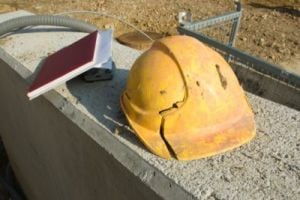 A company and its director were prosecuted over a worker's death at Adelaide's desalination plant construction site and both were fined a total of $400,000 plus court costs.
A company and its director were prosecuted over a worker's death at Adelaide's desalination plant construction site and both were fined a total of $400,000 plus court costs.
In July 2010, the incident happened where the victim named Brett Fritsch, 35, died instantly when a 1.8-tonne steel beam fell onto him during building work. Later on, it was discovered that the steel beam fell because the sling holding it were too soft.
The company involved was a rigging company called Ferro Con SA. The company director is Paolo Maione. Both of them were prosecuted for breaching the workplace safety laws. The Industrial Court heard that there was no safety planning made before the beam was lifted.
Industrial Magistrate Stephen Lieschke ordered Mr. Maione to release public notices about the company's involvement in the matter. Mr. Lieschke noticed how Mr. Maione and Ferro Con took steps to avoid having to accept most of the legal consequences of their criminal conduct as determined by the court of justice. Mr. Maione successfully called an insurer to pay his fine. But he also undermined the court's sentencing powers by negating the principles of both specific and general deterrence. Mr. Maione’s actions are showing any employers that there is no need to fear any consequences because the insurance company can cover the criminal penalties for OHS offences.
According to Mr. Lieschke, Mr. Maione expressed regret and remorse over the offence. The company, now in liquidation, also expressed regret. However, Mr. Lieschke believes that Mr. Maione's actions contradicted his genuine acceptance of the legal consequences of his criminal offence. Hence, Mr. Lieschke declined to grant any reduction of penalty and fined Mr. Maione and the company $200,000 each plus court costs. On the other hand, the court awarded the maximum $20,000 in compensation to the victim's family. Specifically, $14,000 went to the victim's young son.
Meanwhile, union official Aaron Cartledge said the fines had effectively been rendered meaningless. Mr. Cartledge is seeing it as a serious development in the industry. It might be cheaper to get an insurance rather than a good safe systems of work and good equipment, which is a costly exercise. However, more fatalities on works can happen for not providing the right safety equipment and systems of work. While this can be beneficial to the employers, it can be risky to employees.
Mr. Cartledge said there are still unresolved safety issues on the use of soft slings. It is still being used frequently on major building sites. There have been other fatalities around the country caused by the soft slings that were installed properly or were not functioning already.
Charmaine Ferraro, mother of the victim, spoke with reporters as she left the court. She expressed gratitude for the court’s rightful decision but she thought that the compensation was little like a token. Ms. Ferraro said that the compensation doesn't mean anything as it cannot bring back his son. She was hoping though that her public statement would serve as warning to other employers.
Bryan Russell, Executive Director of SafeWork SA, said the court had given a clear message to employers of their legal obligations. The tragedy highlighted the duty of care that must be taken to ensure that workplaces comply with their safety obligations. In this case, every worker can go home safely at the end of the day.


